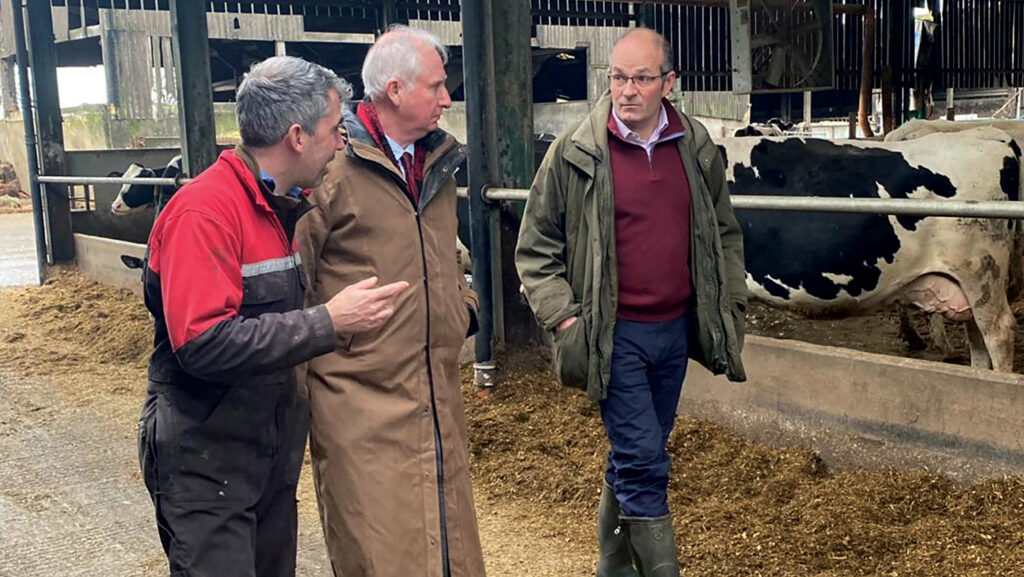Analysis: 100 days of Labour government
 © NFU
© NFU Many would have you believe that the Labour victory on 4 July was more a result of disenchantment with the previous Conservative administration than any particular enthusiasm for Sir Keir Starmer and what the Labour Party had to offer.
And it is true that, in the run-up to the election, the Labour Party was long on promises on how it would better the lives of people in both urban and rural areas, but remarkably short on actual policy detail.
General commitments were made on matters such as improving national food security, cutting red tape at the borders, rewarding farmers for environmental services, protecting them from substandard food imports, buying more British produce, and cracking down on rural crime. But how?
See also: Labour under pressure to rule out cuts to farming budget
The expectation was that, once in government, the new team of ministers would provide the answers.
But the fact remains, uncertainty is still the order of the day, with farmers still wondering how, when and if the government will deliver.
Budget woes
Industry leaders are clearly frustrated – and it is the lack of clarity about the future of the UK agricultural budget that is their biggest bugbear.
NFU president Tom Bradshaw says: “We understand that the budget is tight – we were warned of that from the start – but the frustration is that where there have been opportunities for easy wins, they have not been taken.”
One example is the extended Farming Recovery Fund – the £50m pot promised last May to help with the cost of repairing farmland damaged by last winter’s floods.
“That money was committed to before the election. Many of our members have already spent out repairing the land so that they can plant the next harvest, yet still the money has not been delivered, which is disgraceful,” says Mr Bradshaw.
Another example is the Seasonal Worker scheme, providing visas for migrant workers to help harvest vegetables and process turkeys.
“It costs the government nothing to provide some much-needed clarity. It just needs reconfirming to help businesses plan ahead, but there has not been any willingness to do so,” he says.
TFA
This sense of frustration is shared by Tenant Farmers Association chief executive George Dunn.
He concedes that having the same shadow team of ministers in government is “a good thing”.
“Farming minister Daniel Zeichner has been effective as a shadow minister and built up a good deal of experience.”
Mr Dunn is also encouraged that the new Labour government has restated its commitment to some of the recommendations of the Rock Review of the tenanted sector.
“But there are a number of areas where it has performed less well,” he says.
“It is just marking time on the agricultural budget, and the various infrastructure and productivity grants have been put on hold, too.
“And while Labour has given the green light to the Sustainable Farming Incentive, there is no more information on how farmers can transfer from the old legacy agri-environment schemes to the new ones. That should have been sorted months ago.”
Mr Dunn is equally frustrated by the lack of progress on improving supply chain fairness, or information on how Labour plans to protect British farmers in future trade deals.
The real “bogeyman in the room”, however, is what Labour plans for taxation – with rumours that it may end agricultural property relief for inheritance tax.
This could hit the tenanted sector hard, especially if owner-occupiers who are trading continue to have access to Business Property Relief.
“It could trigger some landlords to attempt to recover possession and to sell their holdings in order to avoid tax. Inevitably, it would also deter owners of land from letting it in the future.”
More will be revealed in the 30 October Budget which Mr Dunn describes as “a line in the sand”. “
After that they will have nowhere to hide and we will find out what the Labour government really stands for.”
Industry opinions
Country Land and Business Association president Victoria Vyvyan
“In its first 100 days, the government has been keen to put economic growth front and centre of its missions, but it must not forget rural areas.
Its National Planning Policy Framework proposals fail to recognise the needs of the rural economy, and overlook the opportunities for housing and farm diversification that is crucial to the sustainability of rural businesses.”
Central Association of Agricultural Valuers secretary Jeremy Moody
“The new Labour government is discovering that life in power is more complicated than campaign slogans.
We have seen a lot of drive on planning, housing, energy and infrastructure, but everything else seems to have to wait until after the budget.
The SFI, for example, now seems to be creating its own inertia.”
Nature Friendly Farming Network chief executive Martin Lines
“We have heard lots of warm words, such as ‘food security is national security’ and their wish to introduce ‘a new deal for farming’.
But progress so far has been limited. We’ve seen very little action on the farming side in the first 100 days.
I am particularly disappointed in the lack of communication coming out of Defra.”
An open letter to the Defra secretary and chancellor of the exchequer
As the Autumn Budget draws near, 12 Farmers Weekly Transition Forum members have written an open letter to chancellor Rachel Reeves and Defra secretary Steve Reed.
Dear chancellor and secretary of state,
British farmers have a vital role – not only to ensure UK food security, but also to enhance the environment and mitigate climate change.
But progress towards achieving these goals is being hampered by ongoing uncertainty around government policies for UK agriculture – including a lack of clarity on the funding of environmental incentives and support for baseline assessment.
Farming is a long-term game – both in terms of food production and environmental management. But growers and livestock producers are finding it difficult to make informed, long-term decisions for their businesses.
The situation is being exacerbated by uncertainty over potential changes to the tax regime and carbon markets. This is discouraging many farmers from investing in more sustainable farming practices which can produce food while meeting net zero targets.
We believe it is possible to address food security and environmental concerns simultaneously. To do so, environmental schemes must focus on reversing climate damage while supporting farmers’ productivity.
Coherent policies must be urgently developed to ensure these schemes can be implemented without delay. At the same time, farmers need assurance that the schemes will be adequately funded to ensure their delivery in the short, medium and long-term.
A clear and properly resourced agri-environmental framework will also encourage new entrants into the sector – helping to ensure it is equipped with the skills and innovative thinking that sustainable farming requires.
Targeted training programmes, support for skill providers, clear policies, and well-developed environmental initiatives are essential to advance UK farming – and ensure it continues to deliver sustainable food security for the long term.
Harper Adams University, Nature Friendly Farming Network, Lantra, Leaf, The Institute for Agriculture & Horticulture, AB Agri, Agreena, Anglian Water, Claydon Drill, GSC Grays, Kite Consulting, Shakespeare Martineau
• The Farmers Weekly Transition project is a cross-industry initiative working to secure a sustainable future for farm businesses and UK agriculture. For details, see fwi.co.uk/transition
Labour in power

© Kirsty O’Connor/No 10 Downing Street
Eight things Labour has done since it came to power
- Continued the rollout of the Sustainable Farming Incentive in England – albeit slowly, with just 800 or so live SFI 2024 agreements in place
- New TB strategy – with an emphasis on badger and cattle vaccination, and an end to badger culling “by the end of this parliament”
- Solar farm approvals – with four new large units signed off by energy secretary Ed Miliband
- Planning restrictions on onshore wind farms also lifted
- Planning and Infrastructure Bill included in the King’s speech, to accelerate housing development
- Committed to publishing the long-awaited land use framework in November
- Confirmed gene editing will be allowed – to encourage precision breeding techniques
- Restricted personal imports of pork and sheep products – to cut the risk of animal disease entering the UK
Eight things Labour has not done in its first 100 days
- Provided any clarity on the future farm support budget – neither dismissing rumours that a £100m underspend will be returned to the Treasury, nor committing to any increase in the £3.6bn annual budget
- Paid anything from the enhanced Farming Recovery Fund – with the £50m earmarked for flood damage repair still sitting in Defra coffers
- Launched the Countryside Stewardship Higher-Tier scheme – leaving farmers in the dark while the clock ticks down on their legacy schemes
- Confirmed the appointment of a tenancy commissioner – one of the key recommendations of the Rock Review
- Committed to the continuation of the Seasonal Worker scheme – essential to secure a migrant workforce for horticultural and poultry businesses
- Made exporting to the EU any easier by cutting red tape
- Announced any measures to tackle unfairness in the supply chain
- Revealed a strategy to bolster national food security
